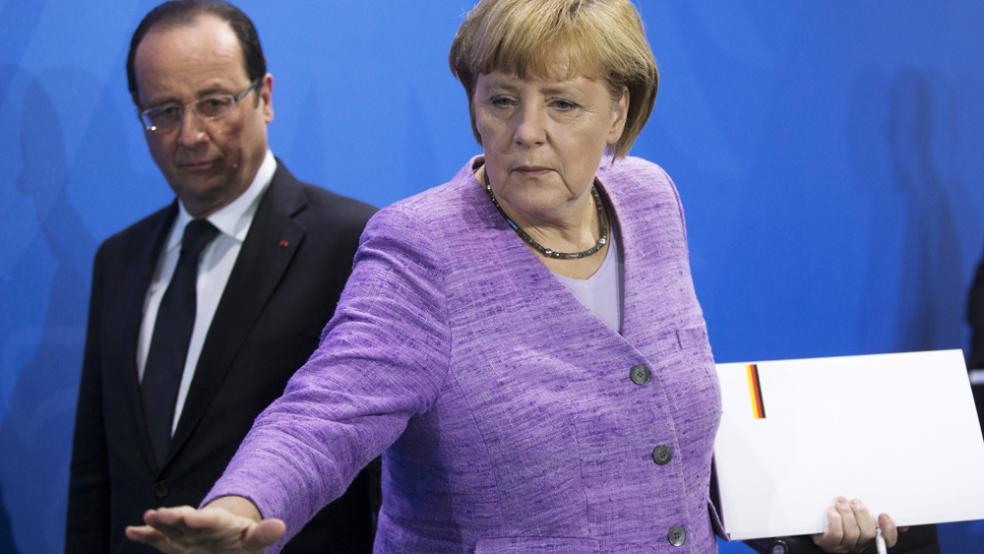While the German election fails to gain broad public interests here, the rest of Europe is watching it with clenched fists.
Chancellor Angela Merkel is leader of the European Union’s most robust economy, making her the de facto leader of Europe. Her austerity policies are now being credited with saving the euro zone, but they are hated in EU countries slammed by the crisis. As the Economist recently put it, Merkel is the “one woman to lead them all.”
But late last week, support for Merkel’s political rivals surged across the Germany, making the final outcomes of today’s federal elections an open question.
While the surge of support for the incumbent’s opposition makes the elections more interesting, it doesn’t make them more exciting. Barring an act of the political gods, Merkel will continue to be chancellor at the end of the day.
Here’s where it gets complicated. Merkel is a member of the conservative Christian Democratic Union (CDU). Right now, she’s partnered with the Free Democratic Party (FDP), which is also conservative, allowing her to control a government that tilts to the right. But if the FDP fails to get 5 percent of the national vote, Merkel will be forced to form a Grand Coalition with liberal Social Democratic Party, which would pull her government to the left.
German politics are confusing by design: the system was created so that no one party can gain complete control (that’s happened before, and the results were horrific). The result is that the pragmatic, intelligent and rather boring Angela Merkel is the undisputed leader of the country.
And her boringness had bled over into the campaign. Televisions are not being overrun by political advertisements. Hired guns aren’t arguing on cable news about whether Merkel will win a third term or be upstaged by challenger Peer Steinbrück. There was just one television debate, but even that was considered a snooze. Even Steinbrück giving the middle finger on the cover of a magazine failed to elicit much interest from the German public.
The only signs that an election will take place today are modest campaign signs posted along Berlin’s streets. But even those are boring by American standards. Merkel’s primary advertisement is a headshot of her, and then the words “Chancellor: For Germany.”
Part of the apathy is that Germans simply don’t get as wound up about politics as Americans. But the other part is pragmatic: Germans like Merkel so much than many refer to her as Mutti, a loving derivation of the German word for mother. Most believe this affection is derived from her simplicity: Germans love her because she’s boring.
“She's quite normal," Edgar Wolfrum, a historian at Heidelberg University, said of Merkel. "She doesn't excel; she's good, average. And that's something everybody can identify with. That's her recipe of success."
"Mrs. Merkel is the right person to lead her country and thus Europe,” the Economist wrote. “That is partly because of what she is: the world’s most politically gifted democrat and a far safer bet than her leftist opponents," the magazine wrote in a recent article endorsing her. "It is also partly because of what we believe she could still become—the great leader Germany and Europe so desperately needs."
Don’t call Berlin
Henry Kissinger once famously asked, “Who do you call when you want to call Europe?” Many world leaders wish that the answer to that question would be Berlin. But Merkel has shown little interest in becoming the leader the Economists envisions.
During this campaign, she’s been almost completely silent on German foreign policy. It came up only once during the lone presidential debate. Merkel has refused to address pressing economic issues, including whether Greece will need a third bailout.
For President Obama, this is more of a nuisance than a true problem. Right now, he has to call London or Paris to deal with security issues, and Berlin to deal with economics. He and Merkel have never shared a close relationship, starting with Merkel’s refusal to allow Obama to speak in front of the Brandenburg Gate in 2008 (in June he gave a speech there to a much smaller audience).
But for European leaders, Merkel’s silence is truly problematic. They have no idea where she plans to steer the eurozone, and whether she’ll permit the structural economic reforms that much of the continent is clamoring for. Many across the continent see her as an unbending taskmaster whose demands for austerity have crippled weaker economic in Spain, Greece and Italy.
Anger toward her bubbled up often and was on full display in late August, when Merkel said Greece should not have been allowed into the eurozone in 2001.
“Her comments cannot be justified," Panos Skourletis, spokesman for Syriza, Greece's primary opposition party, said in one of the more tame reactions to Merkel’s comment. "For there to be such a statement made in public by Mrs. Merkel, even if there is a pre-election period in Germany, is irresponsible. The extreme policies of austerity enforced by Germany are testing European cohesion.”
Hints at a road forward
Merkel’s government has provided some hints as to the direction she’ll take Europe. After the European Parliament passed a law giving the European Central Bank access to financial data for large banks, sources close to Merkel hinted she would be amenable to the other two pillars of European financial reform - the creation of a joint deposit guarantee account and the authority to wind down banks with a unified financial backstop.
But that news gained little attention here. Germans are largely unconcerned with what’s happening in the rest of Europe. They’re content with the German economy, it’s growing international influence and their boring leader. They’re poised to embrace Mutti for another four years, even if much of the rest of the continent would rather cast her and German leadership aside.





